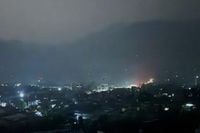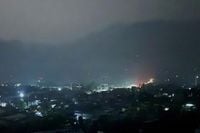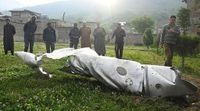On May 7, 2025, tensions between India and Pakistan escalated dramatically following a series of military strikes that have left both nations on high alert. The Indian government stated it conducted a "precision strike" targeting what it described as "terrorist camps" in Pakistan-administered Kashmir. This action was purportedly a response to a militant attack in April that killed 26 people, mostly Indian tourists, near the popular resort town of Pahalgam.
According to reports from Pakistani officials, the missile strikes resulted in the deaths of eight individuals, including two children, and injuries to at least 35 others. Pakistan’s military spokesperson confirmed that their air defenses shot down five Indian aircraft in retaliation, asserting that all targeted sites in Pakistan were civilian areas, contradicting India's claims of targeting militant infrastructure.
Pakistan's Prime Minister Muhammad Shehbaz Sharif condemned India's missile strikes as an "act of war," emphasizing that his country reserves the right to respond forcefully. He stated, "The deceitful enemy has carried out cowardly attacks at five locations in Pakistan," and vowed that Pakistan would retaliate appropriately.
The Indian Ministry of Defence, on the other hand, claimed that their operation, dubbed "Operation Sindoor," was focused and measured, aimed solely at dismantling terrorist infrastructure believed to be responsible for the Pahalgam attack. They asserted that no Pakistani military facilities were targeted and that their actions were necessary to ensure national security.
In the early hours of May 7, loud explosions were reported in various locations across Pakistan, including Kotli, Bahawalpur, Muridke, Bagh, and Muzaffarabad. Witnesses described a chaotic scene as power outages followed the strikes, plunging areas into darkness. The Pakistani military confirmed that Indian forces had launched 24 attacks on six sites, primarily civilian, including mosques.
In response to the escalating conflict, the UK Foreign Office updated its travel advisory, warning against all travel within 10 kilometers of the India-Pakistan border and 16 kilometers of the Line of Control, the de facto border in Kashmir. US President Donald Trump expressed hope that the fighting would "end very quickly," while Secretary of State Marco Rubio stated he was closely monitoring the situation and urged both nations to maintain open lines of communication.
As the situation unfolded, Pakistan’s Defence Minister Khawaja Asif emphasized that the downing of Indian jets was not a hostile act but rather a defensive measure. He stated, "This was a cowardly attack targeting innocent civilians under the cover of darkness," and reiterated that Pakistan would respond decisively to protect its sovereignty.
The international community has reacted with concern, with UN Secretary-General Antonio Guterres calling for maximum military restraint from both India and Pakistan. He warned that the world cannot afford a military confrontation between these two nuclear-armed nations, reflecting fears that the conflict could spiral out of control.
India's foreign minister, Dr. S. Jaishankar, echoed the need for global solidarity against terrorism, stating that the world "must show zero tolerance for terrorism." This statement came in the wake of the recent violence, which has heightened tensions in the region.
Following the missile strikes, protests erupted in various cities across Pakistan, with demonstrators chanting anti-India slogans and burning effigies of Indian Prime Minister Narendra Modi. The Pakistani government has also informed the United Nations Security Council about the situation, raising serious concerns over what it describes as India's unprovoked aggression.
Both countries have a long history of conflict, particularly over the Kashmir region, which has been a flashpoint since the partition of British India in 1947. The recent escalation comes amidst ongoing military tensions, with both sides exchanging fire along the ceasefire line in Kashmir.
In summary, the situation remains fluid, with both nations poised for potential further military action. The international community continues to watch closely as diplomatic efforts are urged to de-escalate the crisis and prevent further loss of life.







